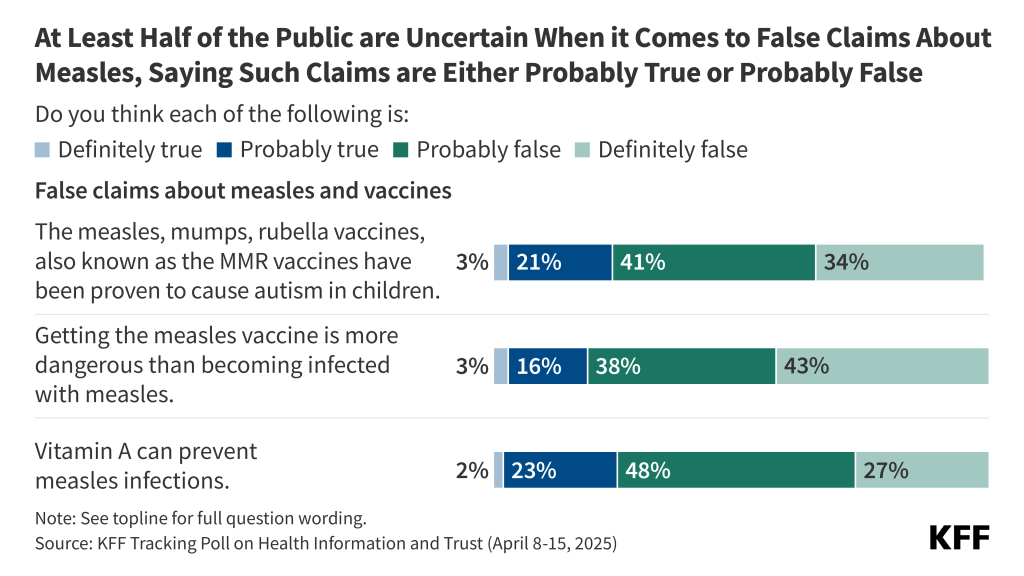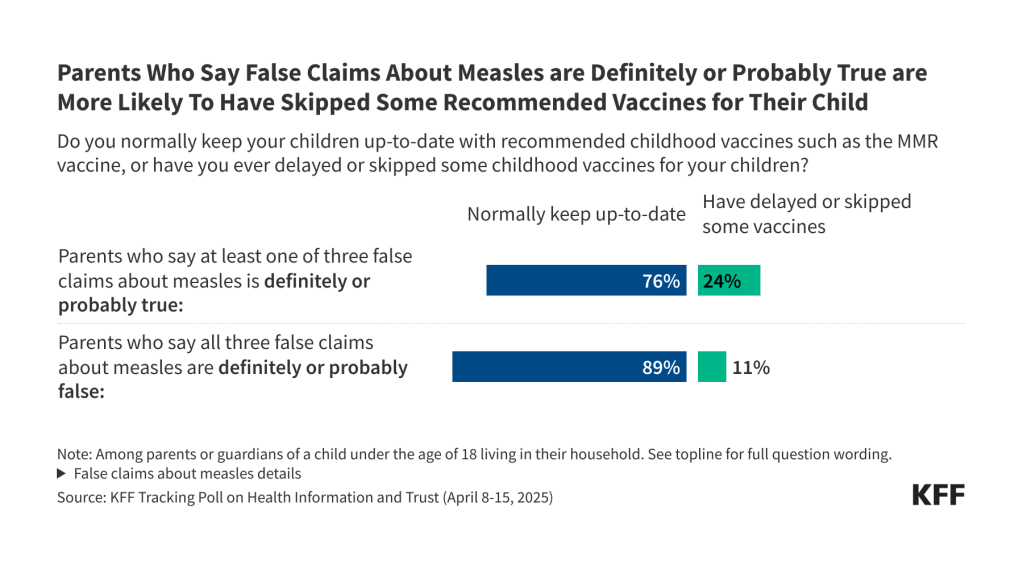
The independent source for health policy research, polling, and news.
Amid Growing Measles Outbreak, More Americans Are Encountering False Claims About the Measles Vaccine, and Many Aren’t Sure What to Believe
Parents Who Lean Toward Believing False Claims about Measles are Less Likely to Keep Their Children Up to Date on Routine Vaccinations
With health officials reporting 800 measles cases in multiple states already this year, most of the public – and most parents – report hearing at least one false claim about measles or the vaccine for it, and many of them aren’t sure what to believe, the latest KFF Tracking Poll on Health Information and Trust finds.
The poll gauges whether the public has heard, and whether they believe, three false statements related to measles circulating amid the outbreak, some of which have been amplified by Health and Human Services Secretary Robert F. Kennedy Jr.: that the measles, mumps and rubella (MMR) vaccines have been proven to cause autism in children, that getting the measles vaccine is more dangerous than becoming infected with measles, and that vitamin A can prevent measles infections.
Fewer than 5% of adults say that each of the three claims is “definitely true,” and fewer than half say each is “definitely false.” That leaves at least half of people expressing some uncertainty about whether to believe each claim, describing each as either “probably true” or “probably false.”

Of the three false claims, the most common is the one suggesting a proven link between the MMR vaccine and autism, which most adults (63%) and most parents (61%) report having heard. A third of adults (33%) and parents (33%) say they’ve heard the false claim about the measles vaccine being more dangerous than the disease – an increase of about 15 percentage points since March 2024. About a fifth of adults (20%) and parents (17%) say they’ve heard the false claim about vitamin A preventing measles.
While most people express some level of uncertainty about the false claims, a quarter of adults (25%) and a third of parents (33%) say that it is “definitely” or “probably” true that there’s a proven link between the MMR vaccine and autism.
Notably, a quarter (24%) of parents who lean toward believing at least one of the three false claims about measles say that they have delayed or skipped some recommended vaccines for their children. That’s more than double the share who report opting out of vaccines among parents who say all three claims are “definitely” or “probably” false (11%).

Despite the prevalence of false claims about the vaccines, large majorities of adults (83%) and of parents (78%) say they are very or somewhat confident that the vaccines for measles, mumps and rubella are safe.
Confidence in the vaccines is higher among Democrats (96%) and Democratic-leaning parents (95%) than among Republicans (79%) and especially Republican-leaning parents (69%), of whom 31% say they are not confident in the safety of the vaccines.
Other findings include:
- About half (51%) of the public says that they are at least somewhat worried about the ongoing measles outbreak. Concern is highest among Democrats (76%), Hispanic adults (62%) and Black adults (61%).
- Most adults (56%) and about half of parents (48%) are aware that there are more measles cases in the U.S. than in recent years. There are large partisan differences, with Democrats (71%) and Democratic-leaning parents (64%) much more likely than Republicans (49%) and Republican-leaning parents (37%) to know measles cases are higher this year.
Most adults (56%) and about half of parents (48%) are aware that there are more measles cases in the U.S. than in recent years. There are large partisan differences, with Democrats (71%) and Democratic-leaning parents (64%) much more likely than Republicans (49%) and Republican-leaning parents (37%) to know measles cases are higher this year.
Designed and analyzed by public opinion researchers at KFF, this survey was conducted April 8-15, 2025, online and by telephone among a nationally representative sample of 1,380 U.S. adults in English and in Spanish. The margin of sampling error is plus or minus 3 percentage points for the full sample. For results based on other subgroups, the margin of sampling error may be higher.